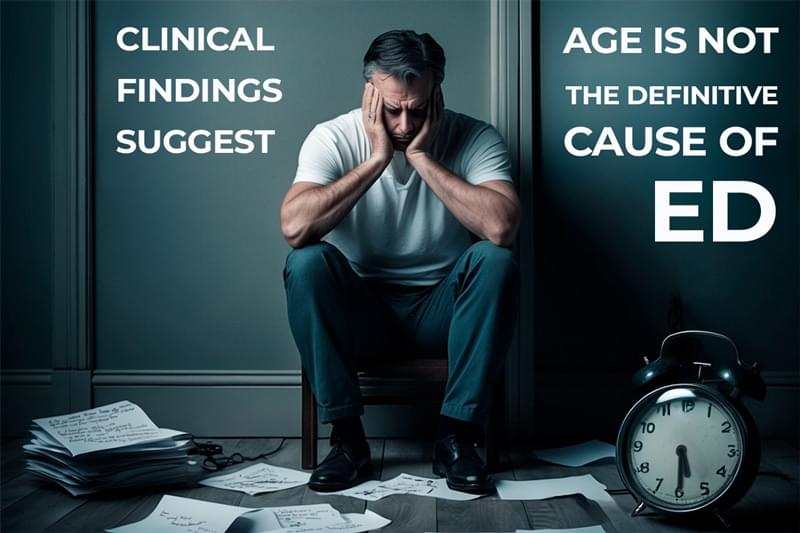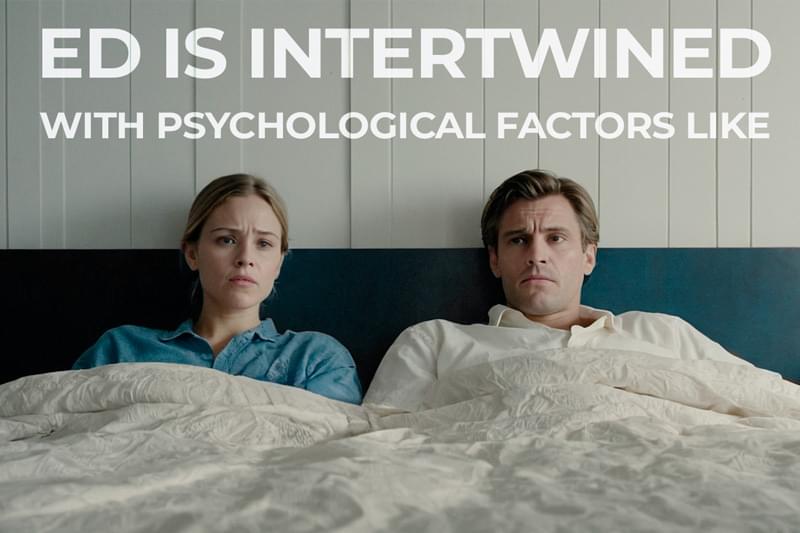Navigating Emotional Turmoil: Impotence's Impact on Mental Health
Understanding Impotence: More Than Just a Physical Issue
Impotence, clinically known as erectile dysfunction, extends beyond the confines of a mere physical predicament, intertwaking complex web of psychological repercussions. Interdisciplinary studies underscore that it is not solely a symptom of underlying physical conditions -- such as cardiovascular disease, diabetes, or hormonal imbalances -- but also deeply entwined with psychological factors including stress, anxiety, and depression. The biopsychosocial model provides a comprehensive framework, illustrating how these multifaceted elements collectively influence the incidence and experience of impotence. It emphasizes the importance of viewing impotence through a broader lens, acknowledging its capacity to serve as both a cause and consequence of psychological distress. This relationship is underscored by research indicating that men with erectile dysfunction exhibit higher levels of psychological symptoms, and vice versa, suggesting a cyclical interplay that complicates the diagnosis, treatment, and understanding of the condition.
In analytical discourse, the psychological impact of impotence is profound, affecting not just the individual but echoing through their intimate relationships. The condition often precipitates a cascade of emotional responses, from initial disbelief and confusion to profound feelings of inadequacy and desolation. These emotional turbulences are not ephemeral; they engrain themselves into the psyche of the affected, necessitating a holistic approach to treatment that encompasses both medical and psychological care. Innovative therapeutic approaches, such as cognitive behavioral therapy (CBT) and couples’ counseling, have shown efficacy in addressing the psychological underpinnings of impotence, facilitating not merely a symptomatic relief but fostering a restoration of self-esteem and relational intimacy.
| Psychological Factor | Impact on Impotence |
|---|---|
| Stress | Increases likelihood of experiencing erectile dysfunction due to heightened cortisol levels. |
| Anxiety | Can lead to performance anxiety, further exacerbating erectile dysfunction. |
| Depression | Contributes to both the onset and persistence of erectile dysfunction, creating a vicious cycle. |
| Self-esteem | Low self-esteem resulting from impotence can perpetuate the condition, inhibiting sexual function. |
The intersection between psychological well-being and sexual health is a critical area of study, revealing that impotence is not merely a physical malaise but a complex biopsychosocial phenomenon. Addressing this condition necessitates a multifaceted approach that respects the intricate realities of those affected, underscoring the importance of comprehensive care strategies that are sensitive to the psychological dimensions of impotence.
The Ripple Effect: Impotence on Relationships and Self-esteem
Understanding the multifaceted nature of what is impotence in men requires delving deeper than its physical manifestations. This condition, medically known as erectile dysfunction, does not just impede sexual performance but significantly influences various facets of relational dynamics and personal esteem. The insidiousness of impotence lies not solely in the sexual domain but proliferates through the very fabric of personal identity and inter-personal connections. Men grappling with this issue often navigate a complex interplay of confidence erosion and diminished self-worth, subtly but notably impacting their roles within intimate relationships. The psychological imprint of feeling less "manly" or adequate can lead to a pervasive sense of inadequacy, affecting how they perceive themselves and are perceived by others.
The ramifications extend beyond the individual, touching the heart of romantic relationships. Intimacy, a pivotal cornerstone of healthy partnerships, becomes fraught with unspoken tensions, misunderstandings, and disconnection. Sexual intimacy is often a significant mode of expressing affection and love between partners. When impeded, it can lead to a chasm of frustration and resentment, often not fully addressed due to the stigma surrounding impotence. This breakdown in communication exacerbates feelings of isolation and guilt, paving a path toward relational discord that, if unaddressed, may culminate in the dissolution of relationships that were once fulfilling.
Moreover, the stigma associated with male impotence contributes to a reluctance in seeking help, thereby perpetuating a cycle of psychological distress. The shadow of shame that cloaks this condition fosters a culture of silence, leaving many men to navigate this turbulent emotional landscape without the requisite support. This isolation can be a breeding ground for severe mental health issues, including depression and anxiety. Therefore, addressing the emotional components of impotence is not just beneficial but crucial for holistic healing. Emphasizing this aspect highlights the importance of comprehensive strategies that include psychological support, thereby encouraging resilience and emotional wellbeing amidst these profound challenges.
Navigating the Emotional Whirlwind: Anger, Shame, and Denial
Delving into the psychological repercussions of impotence, it's essential to acknowledge the complex emotional landscape it engenders. The experience often triggers a profound psychological cascade, where feelings of anger emerge not only as a response to perceived loss of masculinity but as a defense against deeper vulnerabilities. These emotional responses are underpinned by cultural and personal perceptions of what impotence in men signifies, often linked to outdated yet pervasive stereotypes regarding male virility and its connection to identity and self-worth. This anger, while a natural reaction to the initial realization and ongoing struggles with impotence, can also obscure the need for seeking support, leading to isolation and exacerbation of psychological distress.
Shame, another cornerstone emotion in this context, is deeply intertwined with societal stigmas surrounding sexual dysfunction, compelling affected individuals into a silence fraught with personal recrimination. The internalization of impotence as a flaw can severely impact one's self-esteem, fostering a sense of inadequacy that permeates beyond the bedroom into various facets of life. Psychological studies have highlighted the correlation between sexual dysfunction and lowered self-esteem, elucidating how this diminished sense of self can catalyze a withdrawal from intimate relationships, thereby straining connections that are crucial for emotional support and well-being.
Denial, as a coping mechanism, figures prominently in the psychological landscape of impotence, functioning both as a shield from the pain of acceptance and as a barrier to seeking help. This denial is often rooted in fear—fear of judgment, of confronting one's vulnerability, and of addressing the issue head-on—which can significantly delay the pursuit of treatment or support. However, this denial does more than just procrastinate resolution; it perpetuates the cycle of emotional turmoil, hindering the journey toward healing and acceptance. Breaking through this denial requires not only individual courage but also a societal shift towards open and compassionate discussions about male health issues, emphasizing that impotence, like any health condition, deserves understanding, support, and appropriate medical attention.
The Silent Suffering: Depression and Anxiety in Men
In the context of male sexual health, impotence—clinically referred to as erectile dysfunction (ED)—is often dismissed as merely a physical problem. However, the psychological impact it exerts can lead to a profound state of emotional distress. The intricate link between erectile dysfunction and mental health disorders, such as depression and anxiety, cannot be overstated. Studies have consistently highlighted that men suffering from ED are significantly more likely to exhibit symptoms of depression and anxiety. This correlation underscores a vicious cycle where the presence of mental health disorders can further exacerbate impotence, thereby deepening psychological distress.
The onset of impotence often precipitates a crisis in masculinity for many men, confronting their self-perception and societal roles. Within the complex matrix of male identity, sexual prowess is erroneously yet frequently linked to notions of success, vitality, and masculinity. The inability to perform sexually can thus catalyze a profound sense of loss, failure, and emasculation, which, if unaddressed, festers into clinical depression and anxiety. The silence that typically shrouds this issue only amplifies the suffering, as men, adhering to antiquated notions of stoicism, might choose isolation over seeking help due to perceived stigma and embarrassment.
This chronic state of mental turmoil has tangible ramifications on physical health as well, creating a feedback loop that exacerbates both the psychological and physiological aspects of impotence. Depression and anxiety can lead to behaviors such as substance abuse, alcoholism, and avoidance of physical activities, which further undermine sexual function. Moreover, these mental health conditions are known to disrupt sleep patterns, reduce concentration, and diminish overall quality of life, presenting additional barriers to overcoming impotence.
Breaking this cycle necessitates a holistic approach that acknowledges the bidirectional relationship between erectile dysfunction and mental health. Effective strategies include psychotherapy, medication, lifestyle adjustments, and open communication with partners. As awareness increases, the medical community is better positioned to address both the physical and psychological facets of impotence. Emphasizing the importance of mental health care in the management of erectile dysfunction paves the way for more comprehensive treatment plans, offering hope to those trapped in silence.
Breaking the Cycle: Effective Strategies for Emotional Healing
Embarking on the journey towards emotional healing necessitates a multifaceted approach, particularly for men grappling with impotence, a condition that often engulfs one's mental health in silence. Recognizing the deep psychological impact of what is impotence in men, integrating psychological therapies becomes paramount. Cognitive-behavioral therapy (CBT), for instance, has been scientifically validated to mitigate feelings of shame, guilt, and low self-esteem by challenging and restructuring negative thought patterns. Moreover, mindfulness-based stress reduction (MBSR) techniques can significantly lower anxiety levels, promoting a sense of calm and present-moment awareness. These therapeutic avenues do not only address the symptoms but also foster resilience, enabling individuals to construct a healthier self-image and emotional balance.
In conjunction with psychological interventions, fostering social connections that offer support and understanding plays an indispensable role. Isolation frequently exacerbates the emotional distress associated with impotence, making the cultivation of a supportive network critical. Support groups, whether online or in-person, offer a sanctuary for sharing experiences and coping strategies, reducing feelings of loneliness and misunderstanding. Studies have highlighted the therapeutic value of shared experiences, which can significantly diminish the stigmatization of impotence, encouraging a more open and healthy discourse on male mental health and intimacy issues.
The road to recovery might also include lifestyle modifications that underpin mental well-being. Regular physical activity, dietary adjustments, and adequate sleep have been shown to improve mood and reduce symptoms of depression and anxiety. Additionally, engaging in hobbies and activities that enhance personal fulfillment and self-esteem can create positive psychological benefits, reinforcing an individual's sense of purpose and identity beyond their sexual function.
| Strategy | Description | Benefits |
|---|---|---|
| Cognitive-behavioral therapy (CBT) | Addresses negative thought patterns related to impotence. | Improves self-esteem and reduces shame and guilt. |
| Mindfulness-based stress reduction (MBS Charg) | Techniques that promote present-moment awareness. | Reduces anxiety and promotes emotional balance. |
| Support groups | Forums for sharing experiences and strategies. | Reduces loneliness and stigmatization of impotence. |
| Lifestyle modifications | Includes physical activity, diet, and sleep. | Improves overall mental health and well-being. |
This multidimensional approach underscores the importance of addressing both the psychological and social dimensions of impotence, paving the way for comprehensive emotional healing.
Beyond the Bedroom: Improving Communication and Intimacy
Improving the dynamics of communication and intimacy within a relationship transcends the confines of physical interactions; it necessitates a deeper exploration into the emotional and psychological terrains that partners inhabit. Research underscores the importance of open, honest dialogue as a pillar of relational health, positing that such transparent exchanges significantly mitigate the emotional distress associated with impotence. This entails not only discussions about sexual health and preferences but also the vulnerabilities, fears, and desires that shape one's self-identity. Creating a safe space for these conversations allows individuals to navigate their emotional landscapes without fear of judgment, fostering a deeper, more resilient bond.
Furthermore, the integration of non-sexual forms of intimacy plays a critical role in fortifying relationships marred by the challenges of impotence. Studies highlight the efficacy of affectionate touch, quality time, and acts of service in enhancing emotional connectivity and mutual understanding. These expressions of love and commitment are instrumental in reinforcing a sense of partnership and belonging, which can buffer against the erosion of self-esteem and intimacy often witnessed in the wake of impotence. Engaging in regular, non-sexual activities that both partners enjoy contributes to a shared reservoir of positive experiences, thereby counteracting the negative emotional undercurrents that may permeate their interactions.
Lastly, professional guidance from therapists specializing in sexual health and relational dynamics emerges as a cornerstone for couples struggling to navigate the complexities of impotence. Embracing therapeutic interventions, such as cognitive-behavioral therapy (CBT) or couples counseling, provides a structured pathway towards understanding and addressing the intertwined issues of emotional well-being, communication, and sexual satisfaction. Therapists equipped with a profound understanding of the psychological impacts of impotence can offer tailored strategies that empower couples to rebuild their emotional and physical intimacy. Through this holistic approach, couples can learn to transcend the barriers imposed by impotence, cultivating a relationship that thrives on mutual respect, understanding, and profound emotional connection.







